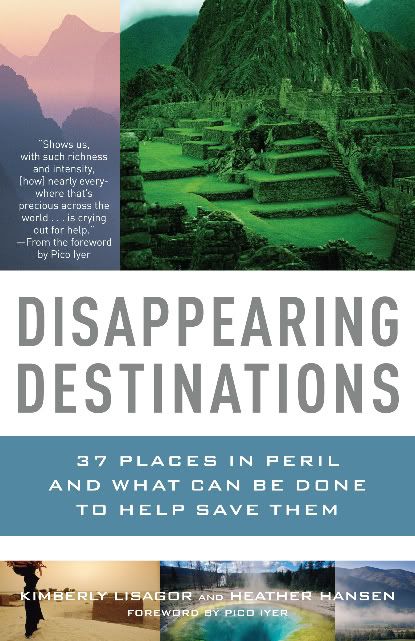This week, Write On! Online interviews Kimberly Lisagor, a freelance journalist who has written about travel and the environment for Outside, Mother Jones, Men’s Journal, National Geographic Adventure, USA Weekend, The New York Times, Los Angeles Times, and other publications. She is co-author (with Heather Hansen) of the critically acclaimed Disappearing Destinations: 37 Places in Peril and What Can Be Done to Help Save Them (Vintage, 2008). Her guide to more than 100 outdoor getaway destinations in North America, Outside’s Wilderness Lodge Vacations (W.W. Norton & Co., 2004), won the Lowell Thomas Award for best guidebook and an Award of Excellence from the North American Travel Journalists Association.

Why did you write these books?
I was visiting my friend (and co-author) Heather Hansen in Colorado, and we got to talking about the book 1,000 Places to See Before You Die. It’s a great book, really inspiring. But we noticed that a lot of the places in it—particularly the natural, outdoorsy places that resonated most with us—were facing environmental and cultural challenges that threatened their futures. Heather said, “How about ‘1,000 places to see before THEY die?'” and we were off and running. Since we’d both covered travel and the environment for many years at that point, it was a natural next step. We were lucky to find a wonderful editor at Vintage who was almost as excited about the idea as we were.
How did you get started? How did you end up in this specialty?
In junior high I took journalism to get out of home ec (still can’t sew); started stringing for the local newspaper in high school; wrote for my college paper; got an internship at the Los Angeles Times (in the good ol’ days when even the coffee fetchers got a paycheck); went to j-school; interned at Outside magazine. I owe my start to an editor at Outside who let me write the “Adventure Advisor” column for a few years while I was figuring out how to be a freelancer.
As for the eco/travel specialty … I grew up traveling and playing outdoors. I’m lucky that editors continue to let me write about those things, because I don’t know much about anything else.
How important is research in your specialty? Do you have a system for how you do things (writing/research)?
It feels a bit silly to call the reporting part of a travel story “research,” but it’s important to think of it that way. If you come back from a trip with just a suntan and some snapshots, there’s nothing to base a story on. I try to do the bulk of the research before I leave home so my travel time is spent collecting interviews and experiences, not looking for the angle. I type up my notes as soon as I get home, and that process usually leads to a very rough outline. Things go downhill from there—I’m one of those writers who can’t write the second sentence until I’m happy with the first. I don’t recommend that approach.
With environment stories, the research challenge is to gather as many viewpoints as possible. You’ve probably heard it said that “for every expert, there is an equal and opposite expert.” What I love about reporting on environmental issues is that the research phase never really ends. Just when you think you’ve gotten closer to a “truth,” you find another element that makes you question your conclusions.
What was your favorite part of the process?
About halfway through writing the manuscript, Heather and I met at a friend’s cabin in Idaho where we holed up for a few days and read each other’s drafts. We were half-reading, half-listening to be sure the other person laughed in the right places and went “hmm, interesting” in the right places. For the most part, we were completely in sync
What’s it like writing with a co-author? How did you two connect?
I’ve heard so many horror stories about nightmarish co-author experiences, but Heather and I did not have two seconds of tension in the entire two years we worked on this. We met in journalism school at UC Berkeley, where we took a pretty brutal magazine writing class together. The teacher (whose name I won’t mention—even though he is now deceased, I still fear retribution from the grave) was a former industry bigwig who took pleasure in crushing the egos of newbies. We read a lot of our work out loud in that class, and by the end of the semester we were each other’s biggest advocates. That’s a great foundation for a book writing partnership. We were a team before we typed a single word.









